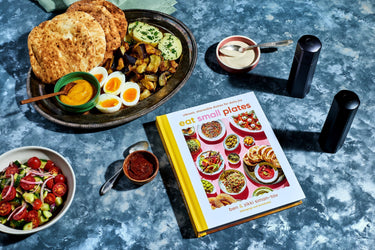5 Things We Learned From Ben & Zikki Siman Tovs' “Eat Small Plates”

Welcome back to Cookbook Club! Every month or so we feature a new-to-us book we love. (Are you following our HexClad recipes Insta? Find links to new book picks there.) Recently we've both eaten barbecue and traveled to Malaysia. Here, we’re exploring the art of Middle Eastern small plates.
If you’ve eaten in a restaurant in just about any major city in the U.S., you know that small plates are definitely a thing. They allow diners to sample a lot of different flavors and textures and build the perfect meal.
In his new cookbook Eat Small Plates, baker, cook and cookbook author Ben Siman-Tov (better known to his legions of social media fans as @BenGingi) and his wife Zikki Siman-Tov (@chefzikki) embrace the concept of eating small plates not as a restaurant fad, but as a traditional Middle Eastern way to host friends and family, with plenty of tips and tricks on how to throw a great dinner party.
“Israeli cuisine has influences from all over the world, and it is blessed with Arabic hospitality and magic,” Ben writes. “When I was growing up, we would welcome guests with the concept of ‘opening the table’—we’d put out an abundance of tantalizing small plates and serve them with bread like pita, laffa, challah or Tel Avivian focaccia. It’s always been my favorite way to eat.”
The book contains a multitude of mouthwatering Middle Eastern recipes. Here are five things we learned from Eat Small Plates.
1. Yes, You Can Avoid Hosting Burnout
According to Ben, “Hosting burnout is a THING.” We get what he’s saying. Think: endless prep work, a mountain of dirty dishes and less-than-stimulating conversations around the table.
In the handy prep section, Ben and Zikki offer tips on how to avoid this. How does Ben never burn out on having people over? For one, he makes sure his dishwasher is empty when friends arrive to ensure easier cleanup. Another tip is to ask guests to bring things that are intentional, not random. And lastly, consider inviting a social butterfly that you seat at the middle of the table to help ensure free-flowing conversations.
“This person will take the pressure off YOU, because they handle the social aspect of the meal, while you focus on the culinary journey,” Ben writes.
2. Embrace the Concept of “Welcome Olives”
Not an olive fan? That’s okay. The Siman-Tovs’ concept isn’t really about the briny little bites; it’s about having stuff on-hand to offer guests when they arrive. Even if you’re not a big cook, there are plenty of things you can purchase to stock your larder: We’re talking cheese, charcuterie, tinned fish, crackers (and other crunchy things like nuts) and something sweet to balance it all out, like jam or seedless grapes. Put together a combination of all of the above, and you’re golden.

3. Dips Are a Do
What do Ben and Zikki always have in their refrigerator? At least a few handmade dips, so that when unexpected guests drop by, they can throw together a snack platter with some fresh bread, olives and other bits and bites in their fridge. Explore the couple’s recipes for everything from Classic Hummus to the cheekily named A Cashew Basil Dip Everyone Will Talk About to discover the dips and spreads that appeal to you.
4. Let Guests DIY
In the couple’s recipe for Deconstructed Sabich, they take the elements of the Israeli street food–tomato-and-cucumber salad, soft-boiled eggs, potatoes, fried eggplant and fresh pita–and serve them so that guests can mix and match as they please.
“It sounds simple, but when these ingredients are strategically prepared and smothered in tahini and amba, they are the heartbeat of lunchtime in Israel,” Ben writes. “This dish does require some heavy lifting on the front end, but if you prepare your ingredients in advance, then all you have to do is fry the eggplant and toss the salad when guests arrive!”

5. Think Beyond Leaves for Salad
Yes, the book does contain a recipe for “The Best Green Salad of Your Life,” but the Siman-Tovs group their salads into categories like “chopped,” “semi-cooked” and “tomato-based.” It’s a reminder to explore all of the building blocks of a salad to create something that, once it comes together, is truly an exploration of flavor and texture.
As Zikki writes, “You will always be biting into something unexpected, refreshing and wildly satisfying.”
Ready to master these Middle Eastern flavors? Pick up a copy of Eat Small Plates and get cooking.





